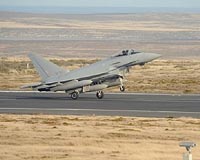| . |  |
. |
Berlin (AFP) Oct 20, 2009 German scientists said on Tuesday they have developed a new technology that could allow air passengers to take liquids on planes again by instantly being able to tell if they are explosive. Knut Urban, head of a team of physicists from the Juelich research centre, said that their prototype device could identify explosive ingredients "in a fraction of a second." Since 2006, passengers have only been allowed to take small amounts of liquids on board, or those bought "air side" in airports after security checks, following the discovery of a plot to blow up transatlantic airliners. Three British Muslims were jailed for life last month for the foiled transatlantic bomb plot, involving near-simultaneous Al-Qaeda-inspired suicide attacks. The new technology, outlined in Superconductor Science and Technology magazine, involves analysing liquids using a broad spectrum of electromagnetic waves that provide a detailed molecular "finger print" of the fluid. Share This Article With Planet Earth
Related Links The latest in Military Technology for the 21st century at SpaceWar.com
 Typhoons On First Operational Deployment
Typhoons On First Operational DeploymentMount Pleasant Complex, Falkland Islands (SPX) Oct 19, 2009 The first Typhoons to be deployed overseas have touched down in the Falkland Islands. The aircraft, from RAF Coningsby, flew into the South Atlantic Islands to take over Quick Reaction Alert (QRA) duties from the Tornado F3s that will return to Britain later this year. Squadron Leader Rich Wells and Flight Lieutenant James Bolton made RAF history by flying the state-of-the-art high tech ... read more |
|
| The content herein, unless otherwise known to be public domain, are Copyright 1995-2009 - SpaceDaily. AFP and UPI Wire Stories are copyright Agence France-Presse and United Press International. ESA Portal Reports are copyright European Space Agency. All NASA sourced material is public domain. Additional copyrights may apply in whole or part to other bona fide parties. Advertising does not imply endorsement,agreement or approval of any opinions, statements or information provided by SpaceDaily on any Web page published or hosted by SpaceDaily. Privacy Statement |